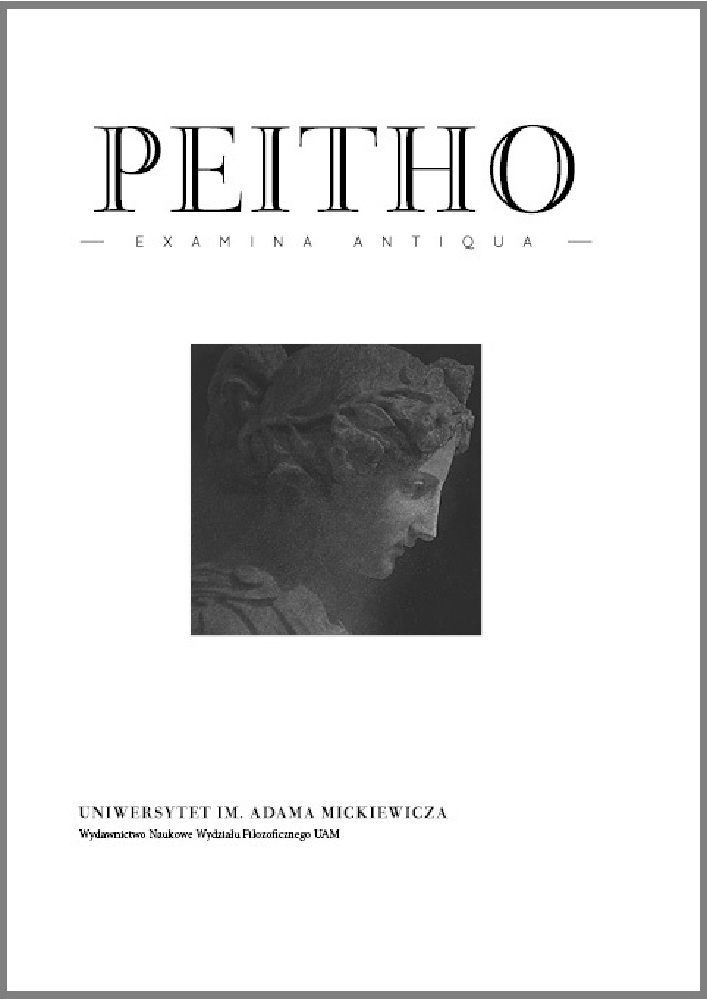Abstract
While linguistic and analytical interpretations of the Euthyphro are usually circumscribed to two passages of the dialogue (Euthphr. 10 a 2–11 b 1), there is a general tendency to disregard the distinction between the ὅσιον and the θεοφιλές. Consequently, one makes hardly any attempt to understand Plato’s criticism of religion. The concepts of θεραπεὶα τοῦ θεοῦ and ἀπεργασία provide us with the possibility of positively characterizing piety and distinguishing it from pure love affection. Contrary to the views of Schleiermacher and Gigon, but following Willamowitz, the present paper shows that the idea of service to the god consists in the doric harmony of Λόγος and Ἔργον, combined with various duties and services to the state. While this is precisely what justice is, the criticism of religion is not solely negative. Through justice, the ὅσιον becomes elevated to εὖ ζῆν and the highest ἀγαθόν in private as well as in public dimension. Without justice, one is left with the neccessity to flee to the other world and embrace the ὁμοούσια with the god, as shown in the Theaetus. If that is the meaning of Socrates’ death, then the idea resembles Kant’s postulate of the immortality of the soul, for in both cases one is faced with the neverending task of realizing the highest good. The question is whether it is possible to realize the δικαιοσύνη in a political life. Plato considers the issue in his the Republic, Sophist, Statesman and Laws. In the Statesman, justice is the primary goal of any political life that can only be attained through cultivting the divine relationship of harmonious elements in the ὅσιον. It is here that Plato’s doctrine of the ὅσιον becomes completed.
References
Cohen, S.M., 1971, “Socrates on the Definition of Piety: Euthyphro 10 A–11B“, JHPh 9, S. 1–13.
Dottori, R., 2006, Die Reflexion des Wirklichen, Tübingen.
Gadamer, H.-G., 1972, Logos und Ergon im platonischen „Lysis“, in: H.–G. Gadamer, Kleine Schriften III: Plato, Husserl, Heidegger, Tübingen, S. 50–63.
Gadamer, H.-G., 1991, Sokrates Frömmigkeit des Nichtwissens, in: H.–G. Gadamer, Gesamelte Werke, Bd. 7: Plato im Dialog, Tübingen, S. 83–117.
Geach, P.T., 1966, “Plato’ Euthyphron. An Analysis and Commentary“, Monist 50, S. 369–382.
Gigon, O., 1972, Platons Eutyphron, in: O. Gigon, Studien zur antiken Philosophie, Berlin–New York, S. 188–224.
Kant, I., 1785, Grundlegung der Metaphysik der Sitten, Riga, in: I. Kant, Werke in sechs Bänden, W. Weischedel (hrsg.), Bd. IV, Darmstadt 1966.
Kant, I., 1788, Kritik der praktischen Vernunft, Riga, in: I. Kant, Werke in sechs Bänden, W. Weischedel (hrsg.), Bd. IV, Darmstadt 1966.
Szlézak, Τ.Α., 2010, Freundschaft zwischen Gott und Mensch. Zur Bedeutung von theophilés bei Platon, in: D. Koch, I. Männlein–Robert, N. Weidtmann (hrsg.), Platon und das Göttliche, Tübingen, S. 216–232.
Wilamowitz, U., 1919, Platon, Bd. 2, Berlin.
Wolfsdorf, D., 2005, „Euthyphro 10a2–11b1: A Study in Platonic Metaphysics and Its Reception Since 1960“, Apeiron 38, S. 1–71.
License
Peitho provides immediate open access to its content on the principle that making research freely available to the public supports a greater global exchange of knowledge.
